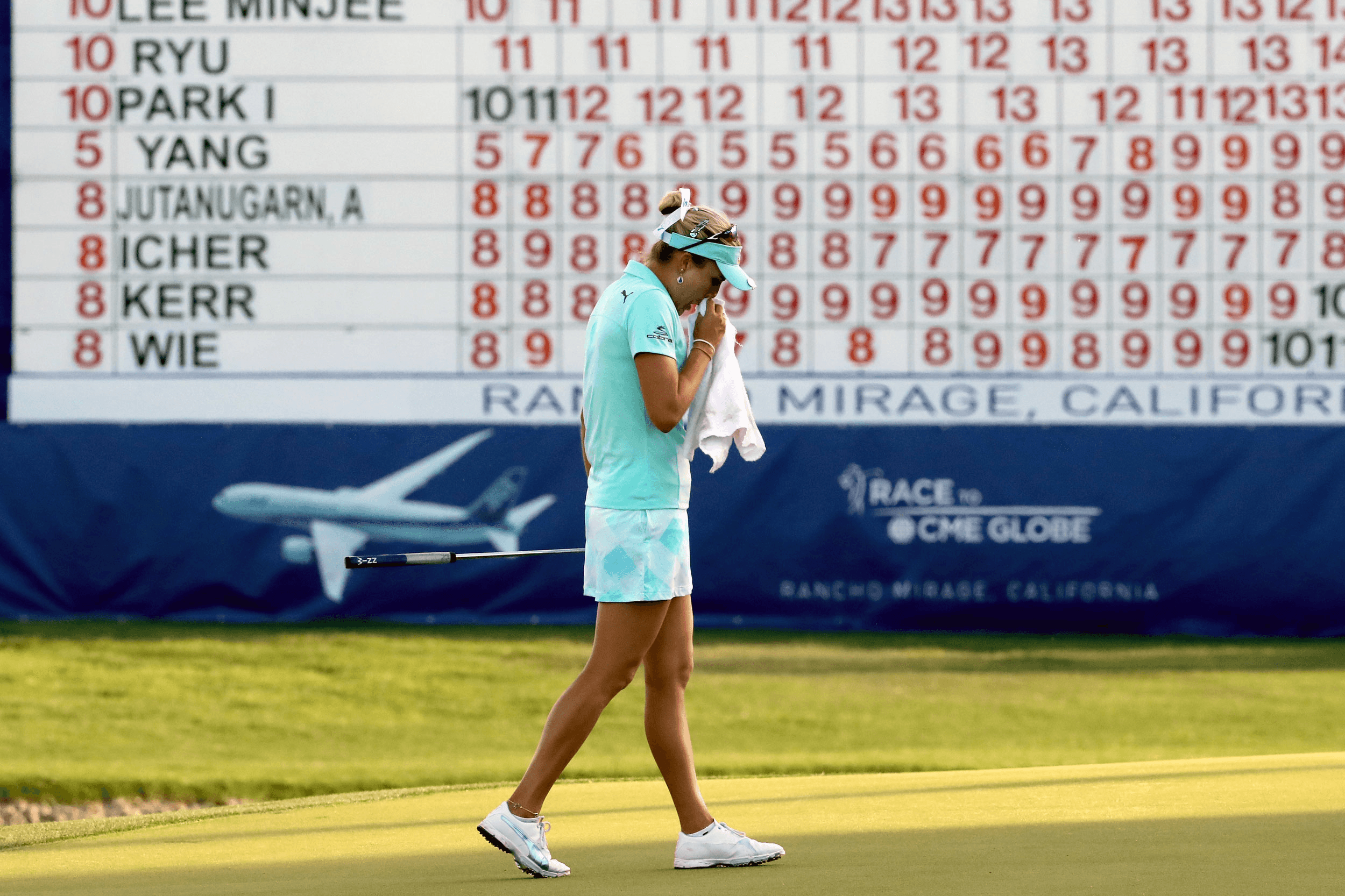Golf Has the Dumbest Replay Rules in Sports
As Lexi Thompson found out at ANA Inspiration, anything can be reviewed at any time — by literally anybody
An anonymous television-watching rando had the biggest, most influential performance during the first LPGA major of the year. Lexi Thompson — a professional golfer, not the aforementioned rando — was cruising through the final round of the ANA Inspiration on Sunday when somebody emailed the association to let it know that Thompson had ever-so-slightly moved her ball before taking a one-foot putt on the 17th hole — on Saturday.
When officials watched the shot in question from the day before, it was clear that the emailer was right. Thompson had moved the ball, though not enough that anybody watching the event in person had noticed. It’s possible her move was deliberate, although one doubts she would risk such a large penalty over such a tiny adjustment on such a simple putt. Regardless, she broke the rules, and she was stunned when she learned what had happened.
The penalty was huge: four strokes; two for the penalty, two for signing a scorecard that didn’t account for the penalty she didn’t know she had committed the day before. One wonders if the tournament-changing snitch knew about this, and intentionally held onto this critique until the next day to ensure that Thompson received a maximum penalty. She had a three-stroke lead when she learned about the penalty, and she instantly fell one stroke back on the leaderboard. Thompson ended up losing in a playoff to So Yeon Ryu. Ryu won $405,000; Thompson won about $250,000. And yet it could have been worse: Until last year’s rule changes about retroactively applied penalties, Thompson would have been disqualified for incorrectly marking her scorecard instead of merely being given two extra strokes.
The AP described Ryu’s victory celebration as “muted.” Thompson cried a little bit. More or less everybody — from Tiger Woods to Thompson’s fellow LPGA Tour members — agreed the situation was ridiculous. And this debacle only adds to the USGA’s recent history of screwing up its biggest events with ill-timed replay controversies.
Stunningly, this is the third time in the past year when awkward rules enforcement has led to players not knowing their score in the closing holes of a major championship. In the three-hole playoff to decide the champion of last year’s U.S. Women’s Open, officials determined via high-definition replay that Anna Nordqvist had committed a penalty on the second-to-last hole and notified the remaining competitors at different points during the decisive 18th hole — Nordqvist played her third shot on that hole under the impression that the score was tied, while her opponent, Brittany Lang, found out about the score change before taking her third shot and thus used a more conservative approach. And at last year’s U.S. Open, Dustin Johnson was told on the 12th hole of the final round that he might have committed a penalty on the fifth hole, and should take that into account while playing out his round. The penalty was ultimately assessed afterward; luckily, he won by three strokes anyway.

Every sport has grappled with how to incorporate replay into rules enforcement. Should any call be subject to review, or just “non-judgment calls”? Should calls at any point in a game be reviewable, or just the ones in the closing minutes? Should reviews be made by on-site officials, or by a centralized replay committee? (The NFL just made a change on this last week.) And how does all of this affect the pace of action in a given sport?
Golf has chosen to handle virtually none of these issues. Anything at any point is up for review by anybody. The only change the sport has made of late is delivering a 2013 ruling that says an illegal movement of the ball should only be penalized if it was “reasonably discernible to the naked eye,” which still leaves a lot up to conjecture.
The silliness here is overwhelming. No other sport allows competitors to play on without knowing what the score is. (The closest thing I can think of: In basketball, a 3-pointer can be retroactively changed to a two at the next stoppage of play, but in the closing minutes of games officials will stop play to immediately review any ruling.) No other sport penalizes athletes for believing they have the score that everybody else believes they have. And perhaps most importantly, no other sport allows people sitting at home to alert officials to errors.
Golf is kinda stuck in an awkward place. On the one hand, the sport adores its old-school customs — I mean, the world’s primary ruling authority is a group of people called “The Royal and Ancient Golf Club.” Perhaps those in charge think that formalizing review would modernize the sport irreversibly.
But failing to act doesn’t maintain the sport’s old-fashioned values — it creates a futuristic vigilante cult. Fans across the world can sit at home endlessly reviewing every shot in excruciating detail before emailing their opinions to the powers that be.
There are relatively simple fixes to be made. The sport could put a time limit on enforcing rule violations, or only allow review on penalties that were noticed by on-site officials. These policies would ensure that some violations would be missed, but occasional slip-ups would be more tolerable than consistent and often maddening confusion, especially in the biggest moments of the most important tournaments.
For now, golf is stuck in 1984. Except instead of Big Brother, A Retired Dude With A Laptop Who Doesn’t Want To Go Outside On A Nice Sunday is always watching.